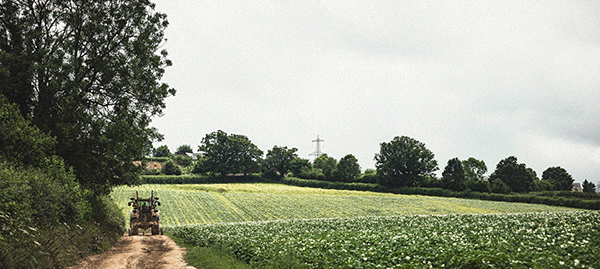Land in conversion to organic farming in the UK has risen by 11.6 per cent after strong sales in organic food sparked confidence in the sector.
The biggest increase was in land set aside to grow cereals (grain and wheat) organically, which rose by seven per cent. Land farmed for organic fruit and nuts rose by a modest two per cent, while organic land for veg increased slightly by 1.2 per cent.
Land in conversion to organic has grown slightly every year, with the exception of 2019 when it fell by almost 15 per cent – a dip that was accounted for at the time by Brexit uncertainty and a lack of clarity over future farming subsidies.
Since 2008, when the area of land farmed organically peaked, the organically farmed area has declined by 34 per cent. It now represents 2.8 per cent of the total farmed area in the UK.
The new stats, released by Defra as part of its annual reporting on the sector, has been welcomed by organic certification body the Soil Association, which said it signals growing confidence and interest in the organic sector.
Senior business development manager Sophie Kirk said: “The incentive for farmers to convert to organic is a direct response to: the significant and sustained growth in demand for organic produce through the pandemic; the availability of government support for organic across some parts of the UK; the technological improvements in organics; and the growing interest amongst consumers and farmers for farming to provide more benefits for the environment and the climate.”
It comes as data from the Soil Association’s Organic Farming and Growing – Does it Stack Up? Report in April 2021 found that net farm income is higher on organic arable and livestock farms compared to non-organic.
Sales of organic food are also seeing strong growth, having grown by 12.6 per cent in 2020 and driven in particular by strong sales from organic box delivery schemes during the pandemic year.
Andrew Bullock, farm manager at Sezincote Farm in Gloucestershire – a 730 hectare mixed arable farm which began conversion in 2019, said: “The biggest positive for us in converting to organics is the reduction in risk.
“Previously we were spending more money upfront without knowing where arable prices would be. With organic the risks and input costs are less than non-organic farming, and farm profit is largely equal. I hope this will increase further once we are fully converted, while we will also deliver improvements to the environment, biodiversity and soil health.”
In most cases, land must be managed organically for a minimum of two years (three years for top fruit orchards) before it is eligible for organic certification. Producers can then sell their produce as ‘organic’ and organic livestock breeding can commence.















Hi Nina,
I just spent some time combing the UK Climate Change Committee’s statements and reports, and I am fairly sure that they must be purposely avoiding the use of the term “organic agriculture”.
I haven’t done the full lifecycle carbon footprint for an organic veggiebox compared to a conventional shopping basket of farm produce – has anyone at Riverford? I’d be very interested to know why the UK CCC is not calling for more organic agriculture – as is the EU
https://www.reuters.com/article/eu-biodiversity-idUSL4N2D13UA
Hi Adam,
I’ve just spoken to Zac, the Riverford sustainability manager and he tells me that it’s an idea they’ve investigated but unfortunately to compare the two it would either be very time consuming or very expensive. Although he suspects that while organic production would possibly come up worse on carbon emissions per unit of food as it normally takes up more land to produce the same output of food. However this can be misleading as he says that most forms of LCA can be pretty binary in what they measure, and don’t always factor in wider benefits such as biodiversity, soil health, water safeguarding etc.
Eg. brassicas from Riverford; probably slightly worse on land use than conventional, but better on carbon, aquatic toxicity and water use. Justified because the land base we use is stewarded a lot better than many conventional fields.
Regarding the government and CCC, the gov are always slightly coy on the matter of organic farming, never overtly encouraging more production. I don’t know if this is a political issue and not wanting to upset the conventional lobbying groups which seem to be more influential here than in some parts of Europe.